Deal's Audiences and Contextual Segment Workflow
This section guides you through the workflow for setting the Audience and Contextual Segment parameters in the Deal Portal. For the Add your Deal's Audiences and Contextual Segment field details, see the Data Definition for Deal's Audiences and Contextual Segment section
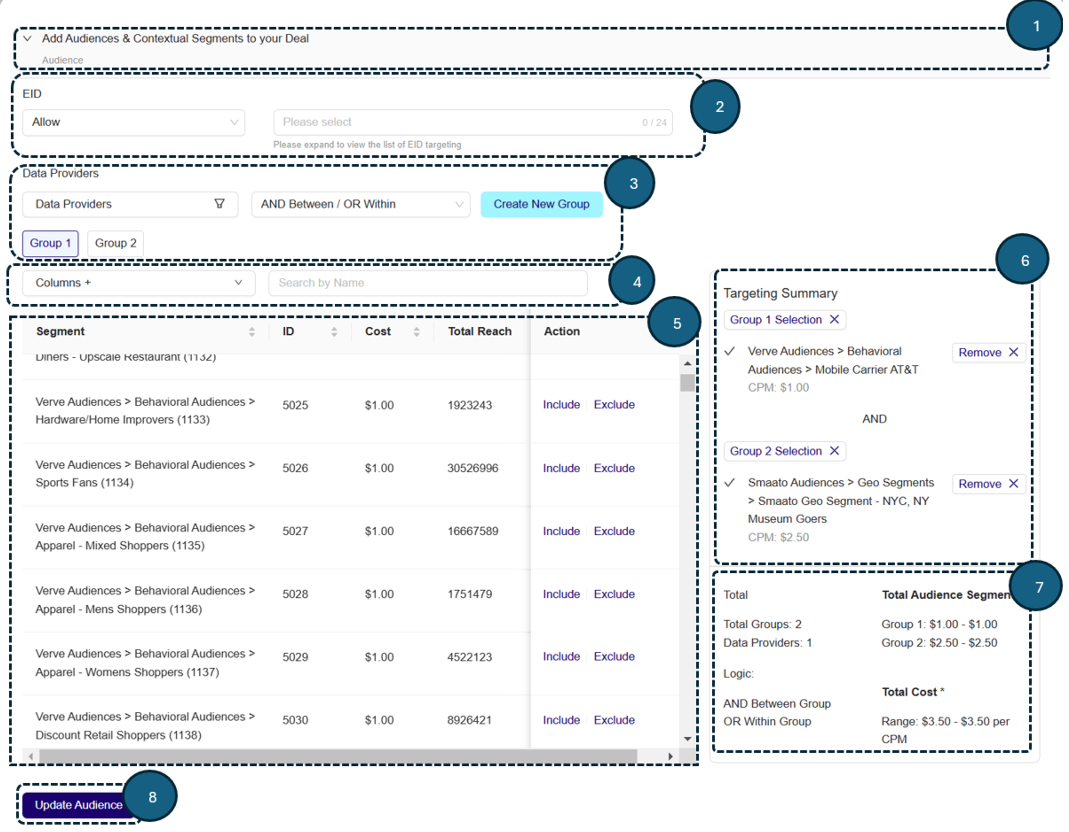
Add your Deal's Audience and Contextual Segments
Follow these steps for Add your Deal’s Audience and Contextual Segment parameters:
1. Add your Deal's Audience and Contextual Segments
- Click to expand the Add your Deals’ Audience and Contextual Segments section. This section allows you to target your deal setting based on EID, audience data provider and audience segment.
2. EID
-
From the EID dropdown menu for, select either the Allow or Block option. The default option is set to Allow.
-
When you select the Allow option, you permit your selected Universal ID/EID targeting to display your ads.
-
When you select the Block option, you restrict your selected Universal ID/EID targeting from displaying your ads.
-
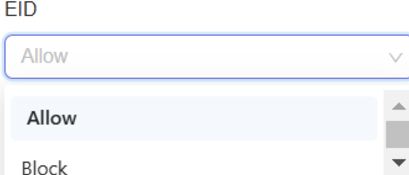
Select Allow or Block option for EID
- From the dropdown list, click to select one or more EID option you want to allow or block for your ads.
As a result your deal will be passed downstream to DSPs only for requests that contain specific EIDs you want to target. You can select the following options:
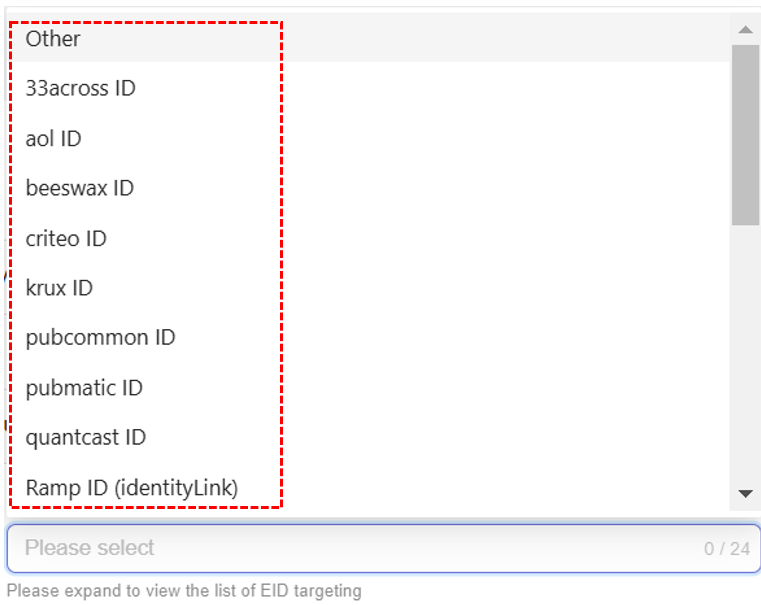
Select EID option
-
After you select the EID option, your selected EID option will be automatically added and saved to your deal.
-
From the dropdown menu for EID, select either the Allow or Block option. The default option is set to Allow
- When you select the Allow option, you permit your selected Universal ID/EID targeting to display your ads.
- When you select the Block option, you restrict your selected Universal ID/EID targeting from displaying your ads.

Remove selected EID option
3. Data Providers
-
Select Data Providers:
-
Data Providers:
-
Click on the Data Providers dropdown to filter segments by Audience Data Providers or Audience Name.
-
Audience Data Providers include: Verve Audiences, Smaato Audiences, and 3rd Party Audiences.
-
Audience Name includes: MomentsAI, First Party Audiences, and Adelaide.
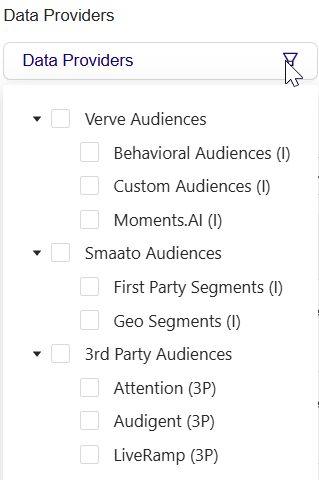
Data Providers Filter
- Click the checkboxes next to the desired Audience Data Providers and Audience Name to include or exclude them from your deal targeting For example, the Figure below shows that multiple data providers, including Verve Audiences, Smaato Audiences, and their respective audience names, have been selected for deal targeting.
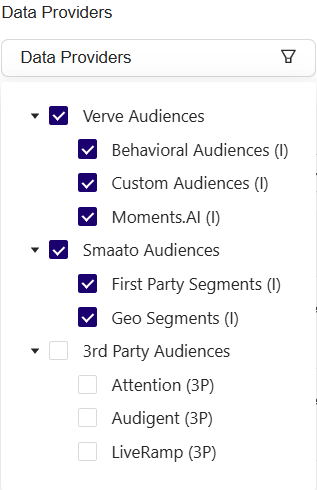
Select Data Providers
- After selecting your data providers and audience name, the Audience Segment table will display relevant field details such as Description, ID, Cost, and Total Reach.
You can further customize the view of the Audience Segment table by selecting additional fields from the Column dropdown menu.
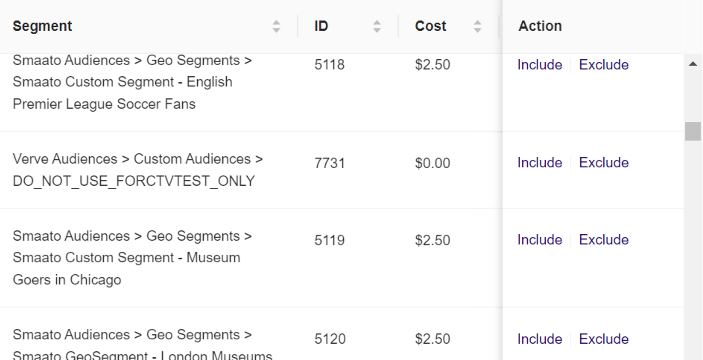
Audience Segment table
- Use the Include or Exclude options to specify which segments to add or remove in your deal targeting.
-
-
-
AND Between / OR Within:
-
The Grouping Logic dropdown allows you to determine how audience segments are combined when creating audience groups.
-
From the dropdown menu, click to select either of the following options for logical grouping operations:
- AND Between / OR Within
- OR Between / AND Within
-
Select the AND Between / OR Within from dropdown menu when you want to target users who meet all specified conditions across different segments.
- AND Between: You must meet both the Smaato Geo Segment for Paris, France Museum Goers AND the Verve Behavioral Audience segment for Apparel – Men's Shoppers.
- OR Within: You can be part of either the First Party Segments of Smaato or the selected Geo Segments.
-
Select the OR Between / AND Within from the dropdown menu when you want to target criteria to include any segments that meet the specified conditions.
-
-
Create New Group:
- After you set the segments, you create a Group 2 by clicking the Create New Group button.
- Each new group can be set with different audience segments and targeting criteria.

Create New Group
- You can create up to 5 Groups.
- Group 1 is created by default when you access this section.
4. Column
- Click on the Column + dropdown menu to see available columns that can be displayed in the Audience Segment table. The Segment and Action columns are selected by default and cannot be unselected.
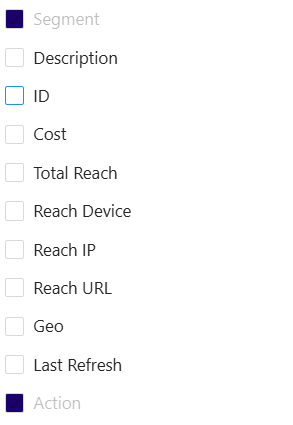
View Column
- Mark or unmark the following fields to customize the view of the field details in the Audience Segment table. The figure below shows that selecting all columns will display all field details in the Audience Segment table, including columns, such as Description, ID, Cost, Total Reach, Reach Device, Reach IP, Reach URL, Geo, and Last Refresh.
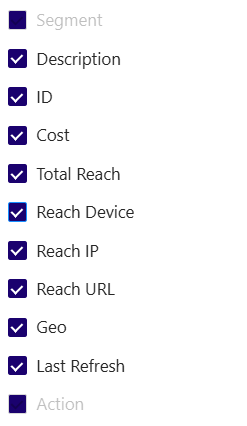
Select Column
-
Search Criteria:
- You can search for a specific segment record in the Audience Segment table using the following criteria:
- Data Provider: Search for segment record details by providing the Data Provider name in the Search bar. For example: Verve, Smaato, 3rd Party Audience, etc.
- Audience Name: Search for segment record details by providing the Audience Name in the Search bar. For example: Behavioral Audiences, Customer Audiences, MomentsAI, First Party Audiences, or Adelaide.
- Segment Name: Search for segment record details by providing the segment name in the Search bar. For example, Mobile Carrier AT&T, Mobile Carrier Verizon, Mobile Carrier T-Mobile.
- Segment ID: Search for segment record details by providing the Segment ID in the Search bar. For example: 5003, 5004, 5005.
- Type the Audience Name or Segment Name in the Search by Name field. The Audience Segment table will dynamically update to display only the name and segment name that match your search criteria.
- You can search for a specific segment record in the Audience Segment table using the following criteria:

Search criteria by Segment Name
5. Audience Segment Table
- When you click Include, the selected audience segment is actively targeted within your deal. This means your ads will be shown to users who belong to the selected audience segment. For example, the Figure below selecting Include for Smaato Audience >Geo Segment > Smaato GeoSegment – Paris, France Museum Goers ensures your ads will be displayed to users in Paris, France who are part of the Museum Goers segment.

Include Audience Segment in deal target
- When you click Exclude, the selected audience segment is excluded from the deal target within the deal. For example, the Figure below selecting Exclude for the Verve Audiences > Behavioral Audiences > Income_Below_35k segment ensures your ads will not be shown to users whose income is below 35k, even if they meet other targeting criteria.

Exclude Audience Segment from deal target
6. Targeting Summary
-
After setting your audience segments, navigate to the Targeting Summary section available on the right side of the Targeting section
- The Targeting Summary displays details about the currently selected group. For example, Group 1 and Group 2 . It includes the audience segments that have been included in each group's selection, such as :
- Group 1 selection: Verve Audiences > Behavioral Audiences > Apparel - Mens Shoppers (1136)
- Group 2 selection: Smaato Audiences > Geo Segments > Smaato Geo Segment - NYC, NY Museum Goers.
Using AND Between indicates the deal will target users who are both men's apparel shoppers and museum goers in NYC, US.
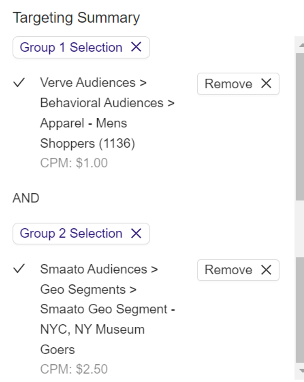
Targeting Summary
- Click the Remove X button to remove the segment name from the group.
7. Target Summary Overview
- Total:
- Displays the total number of groups and data providers in the Summary section.
- Total Groups: Indicates the groups you have created (for example., Total Groups: 2) in audience segment.
- Total Data Providers: Displays the number of data providers included in your audience targeting (for example, Data Providers: 2).
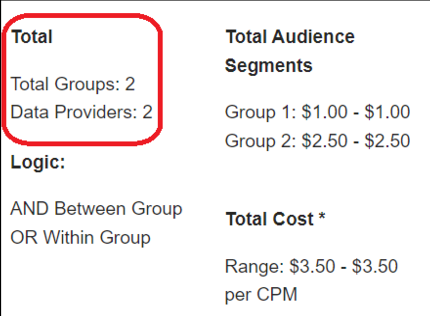
Display Total Groups and Data Providers
- Total Audience Segments:
- Displays the total audience segments for each group listed along with their associated CPM (Cost Per Thousand Impressions) range.
- In summary, the pricing for the segments within each group is uniform, with **Group 1** targeting audiences at $1.00 CPM and **Group 2** at $2.50 CPM.
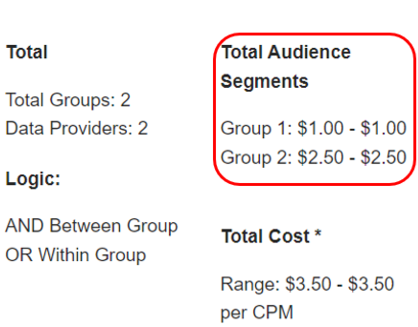
Total Audience Segments
- Logic:
- AND Between Group / OR Within Group: Indicates how the segments are combined when targeting for deal.
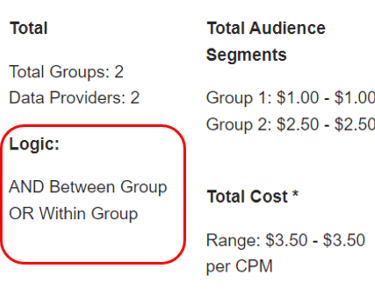
Display Logic
- Total Cost :
- Displays the total cost for targeting both Group 1 and Group 2 and the sum of the individual CPM (Cost Per Thousand Impressions) values.
- Based on information provided in Figure:
- Group 1 has a CPM of $1.00.
- Group 2 has a CPM of $2.50.
- The total cost per thousand impressions (CPM) for both groups combined is: 1.00 (Group 1 CPM)+2.50 (Group 2 CPM)=3.50
- You will pay $3.50 for every 1,000 impressions served to the combined audience from both groups.
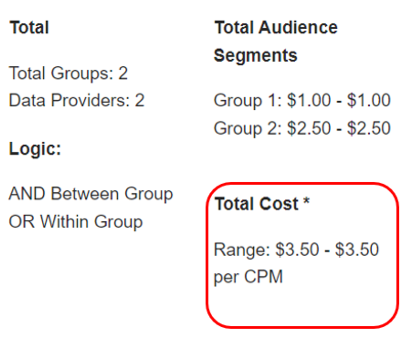
Total Cost
8. Update Audience
- Click the Update Audience button to update the audience segment to the targeting setting.